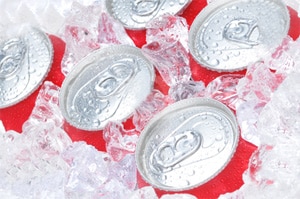You might depend on diet soda as a refreshing, calorie-free complement to lunch or dinner, or for a caffeine boost to get you through the afternoon. But can you actually be addicted to this carbonated drink?
 Sugar-free soda debuted in the 1950s, marketed as a “healthy” and diabetic-friendly alternative to sugar-sweetened drinks. Over the years, this no-calorie carbonated beverage has been branded as a diet drink for those watching their waistlines. But for many, diet soda consumption has evolved into a serious habit that can be hard to break.
Sugar-free soda debuted in the 1950s, marketed as a “healthy” and diabetic-friendly alternative to sugar-sweetened drinks. Over the years, this no-calorie carbonated beverage has been branded as a diet drink for those watching their waistlines. But for many, diet soda consumption has evolved into a serious habit that can be hard to break.
How does diet soda addiction develop? Researchers have several theories. One theory suggests that caffeine addiction is the real problem ““ although this does not explain a dependency on caffeine-free diet sodas.
Another theory is that people condition themselves to crave diet soda in certain situations. For instance, if you always drink a diet soda with your lunch, you’ll start yearning for it even before lunchtime comes.
Yet another theory is that the artificial sweeteners in diet soda can actually lead to overconsumption or addiction because they don’t truly satisfy your craving for sweets. In one recent study, women consumed two different drinks ““ one sweetened with sugar and the other with sucralose (Splenda). Although they couldn’t taste the difference between the two, MRI results revealed that the sucralose drink didn’t stimulate the brain’s reward center the way the sugary drink did. In other words, diet soda offers a smaller level of satisfaction, leading you to drink (and crave) more.
What are the dangers of drinking too much diet soda? Although current research is unclear about the direct effects, excessive diet soda consumption has been linked with a higher risk of low bone mineral density in women and may be linked to increased risk for stroke and type 2 diabetes.
Not sure whether you’re a casual fan or a full-blown addict? Count the bottles and cans. If you’re downing more than five or six diet sodas per day, you may be hooked. Also, consider the consequences of not getting your fix. Will it drastically affect your mood or put you into a panic? If so, it can be classified as an addiction.
Breaking this kind of habit can be difficult, especially for those who are addicted to caffeine. Try to cut your consumption slowly, substituting decaffeinated tea or water for soda. Once you establish new habits and routines, it will be easier to avoid the temptation to grab a diet soda.
